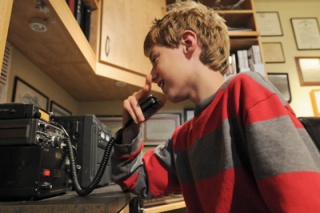Alex Banbury may be the youngest Islander to earn his amateur radio technician license. At age 10, the Island Park fifth-grader has joined the Mercer Island Radio Operators (MIRO) Club, alongside his father and a dozen other ham radio veterans. The hobby, which dates back to the early 1900s, unites radio enthusiasts across the globe. Amateur, or “ham” radio as it is often called, is used for public service, personal enjoyment and as a means of exploring radio technology.
“It’s a federally licensed hobby that allows you to use the radio frequency spectrum,” said Banbury’s father, John. “You take an exam — after a technician class — and if you pass, you earn radio operating privileges.”
These privileges can be applied during times of disaster — such as a situation when all phone lines are down — or purely for the enjoyment of communicating with radio “hams” across the globe.
“One of the key things it’s used for is emergency communications. After Hurricane Katrina struck, amateur radio was the only form of communication in the area,” John said, adding that he and his fellow MIRO members serve as “emergency workers” for Mercer Island. “Our group banded together so we could work with emergency services personnel to provide communication in a situation where the phone systems go down.”
It is a responsibility that Alex is eager to accept.
“You really feel like you’re needed if there’s an emergency situation,” the Island Park fifth-grader said. “I haven’t been in one yet, but I think I could do it.”
Alex’s fascination with ham radio began as a young child. His father, who has been involved with amateur radio for decades, used to sit Alex on his lap while communicating with a friend in Wichita, Kansas. Alex would listen in fascination as John explained the basic concepts of radio transmission, circuit analysis and Morse code.
“It opens up the mind for kids,” John said. “It provides a line to globalization, to understanding geography. You can talk to Africa. You can communicate with people throughout the world.”
One day, but not yet. The license that Alex holds allows him to communicate on Very High Frequency (VHF) band, which covers local territory. In order to move on to worldwide frequencies, he will have to pass another test. And the 10-year-old has every intention of doing so.
“I’m hoping to get the highest license possible. I can speak German, so I want to talk to people in Europe and all around the world. I want to learn about exciting things and places,” he said.
For now, Alex is quite content radioing within the Puget Sound area. His father recently discovered a Lake Washington youth amateur radio club. Communicating through a radio “net,” the youth send messages back and forth to each other on Sundays. Alex is eager to get involved in the club. In the meantime, most of his knowledge comes from his father and other amateur radio veterans. The two attended their first MIRO meeting last month, and Alex is eager to recruit others his age.
“Right now, it’s mostly just adults, so I want to get more kids involved,” he said. “Some of my friends are interested, and I’m going to help them get their licenses. It would be great if more kids were into it.”
Until then, Alex shares most of his time radioing with his father in his home office, on the way to school in the car, and at the CCMV radio room. It is a hobby that, generations apart, both can share.



